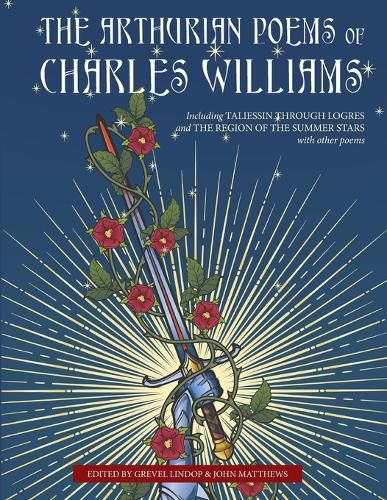Readings Newsletter
Become a Readings Member to make your shopping experience even easier.
Sign in or sign up for free!
You’re not far away from qualifying for FREE standard shipping within Australia
You’ve qualified for FREE standard shipping within Australia
The cart is loading…






This title is printed to order. This book may have been self-published. If so, we cannot guarantee the quality of the content. In the main most books will have gone through the editing process however some may not. We therefore suggest that you be aware of this before ordering this book. If in doubt check either the author or publisher’s details as we are unable to accept any returns unless they are faulty. Please contact us if you have any questions.
Williams wanted his Arthurian poem to be a universal epic: not just a tale of early-Medieval heroics, but a poem that would use its narrative to portray the human condition, and the world, with the kind of completeness found in Milton's Paradise Lost or Dante's Divine Comedy.
Charles Williams is perhaps the least well known of the Inklings, the writers' group based in Oxford which included J.R.R. Tolkien and C.S. Lewis. In making this collection of Williams's major Arthurian poetry we have sought to make available again, after several years out of print, all his previously published verse on the abiding subject that dominated his work and life from the early 1900s to his death in 1945. The earliest work, published here for the first time since its original appearance in 1913, is the 'Pageant Song of Gwent', which shows Williams thinking about the Arthurian legends even this early. This, along with poems from Heroes and Kings (1930) and Three Plays (1931), comprises all of Williams's early published work on the subject, and is followed by his mature work, contained in the two major sequences Taliessin Through Logres (1938) and The Region of the Summer Stars (1944), which form the centre of this collection.
The volume includes an introduction by Grevel Lindop (biographer of Charles Williams) and an essay on Williams's work by Arthurian scholar, John Matthews.
$9.00 standard shipping within Australia
FREE standard shipping within Australia for orders over $100.00
Express & International shipping calculated at checkout
This title is printed to order. This book may have been self-published. If so, we cannot guarantee the quality of the content. In the main most books will have gone through the editing process however some may not. We therefore suggest that you be aware of this before ordering this book. If in doubt check either the author or publisher’s details as we are unable to accept any returns unless they are faulty. Please contact us if you have any questions.
Williams wanted his Arthurian poem to be a universal epic: not just a tale of early-Medieval heroics, but a poem that would use its narrative to portray the human condition, and the world, with the kind of completeness found in Milton's Paradise Lost or Dante's Divine Comedy.
Charles Williams is perhaps the least well known of the Inklings, the writers' group based in Oxford which included J.R.R. Tolkien and C.S. Lewis. In making this collection of Williams's major Arthurian poetry we have sought to make available again, after several years out of print, all his previously published verse on the abiding subject that dominated his work and life from the early 1900s to his death in 1945. The earliest work, published here for the first time since its original appearance in 1913, is the 'Pageant Song of Gwent', which shows Williams thinking about the Arthurian legends even this early. This, along with poems from Heroes and Kings (1930) and Three Plays (1931), comprises all of Williams's early published work on the subject, and is followed by his mature work, contained in the two major sequences Taliessin Through Logres (1938) and The Region of the Summer Stars (1944), which form the centre of this collection.
The volume includes an introduction by Grevel Lindop (biographer of Charles Williams) and an essay on Williams's work by Arthurian scholar, John Matthews.